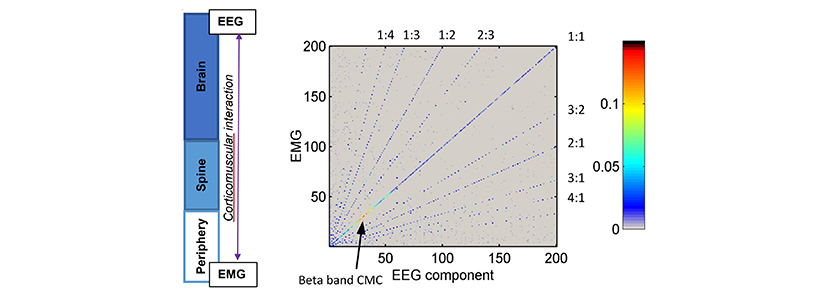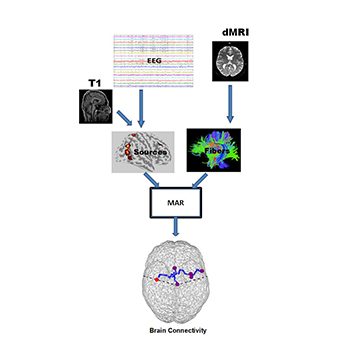Yuan Yang, PhD
Work in the lab of Yuan Yang, PhD, focuses on the development of novel neural signal (EEG, EMG) processing and multi-modal brain imaging (EEG, MRI) tools to quantify neural connectivity in the nervous system. Assessing the connectivity between neuronal populations reveals how the nervous system adapts and reorganizes after neural disorders (e.g., stroke) and during the recovery, so as to evaluate neural impairments and facilitate neurorehabilitation interventions.
Links
Current Projects
Quantifying Nonlinear Neural Connectivity During Movement Control
Neural interactions in the human nervous system can occur as a nonlinear process. Due to lack of an effective nonlinear method, methods based on linear coherence are extensively used to investigate neural interactions between the central nervous system and the periphery during movement control. Yang proposed and developed a novel method to assess nonlinear neural connectivity and time delays in neural systems. His method unveils the neural coupling within sensorimotor system in a more complete way than the commonly used (linear) corticomuscular coherence method. The results indicate that the nonlinear neural coupling likely comes from multi-synaptic interactions. Due to this remarkable contribution, the team received the 2017 Hojjat Adeli Award for Outstanding Contributions in Neural Systems for the paper entitled “A General Approach for Quantifying Nonlinear Connectivity in the Nervous System Based on Phase Coupling” (Int J Neural Syst. 2016;26(1):1550031. PubMed PMID: 26404514).

Integration of Multi-Modal Brain Imaging Approaches to Understand Brain Function

Brain connectivity studies reveal how different brain areas work together during a task. Using advanced methods, Yang investigated brain connectivity during the movement control as well as cognitive tasks. These studies provide us with a better understanding of how the brain processes incoming information and controls body movements. In collaboration with Jules Dewald, PhD, and international collaborators, Yang very recently proposed a novel multi-model brain imaging method that combines high-density EEG, T1 MRI and diffusion MRI. This approach allows tracking of neural information flow between cortical sources through existing neural tracts. It has the potential to be developed into a new neuroimaging tool to monitor brain neural network changes post hemiparetic stroke. This is expected to increase our understanding of stroke induced neural changes and allow us to determine the effect of more targeted neurorehabilitation interventions that reduce such changes.
Lab Members & Student Projects
Runfeng Tian, MSc (Clinical Research Associate)
Tian received his master's degree in biomechanical engineering from Delft University of Technology, the Netherlands. He was Yang's former graduate student (co-supervised with Professor Frans van der Helm). He is a clinical research associate in Yang's lab, working on developing a multi-brain imaging approach (project 2) to assess the dynamic information flow in the brain network.
Nirvik Sinha (US-India Khorana Scholar 2018)
Sinha has a MD background and is currently doing his research project in Yang's lab. He is working on computational modelling of multi-synaptic neural systems, which will eventually lead to a better understanding of the usage of backup indirect motor pathways (e.g., corticobulbospinal tracts) following a unilateral brain injury.
Thomas Arend Michiel Plaisier, MEng (PhD Student with Dewald)
Plaisier is completing his PhD in biomedical engineering. Yang serves as a committee member to support his thesis.
Team
Principal Investigator
Collaborating Faculty
- Julius Dewald, PhD
- Netta Gurari, PhD
- Charles Heckman, PhD
- Jun Yao, PhD
- Frans C.T. van der Helm, PhD (Professor, Delft University of Technology, The Netherlands)
- Alfred Schouten, PhD (Associate Professor, Delft University of Technology, The Netherlands)
- Hua-Liang Wei, PhD (Senior Lecturer, University of Sheffield, UK)
- Isabelle Bloch, PhD (Professor, Telecom ParisTech, France)
- Sylvain Chevallier, PhD (Associate Professor, Université de Versailles St-Quentin, France)
- Jifeng Guo (Associate Professor, Xiangya Hospital of Central South University, China)